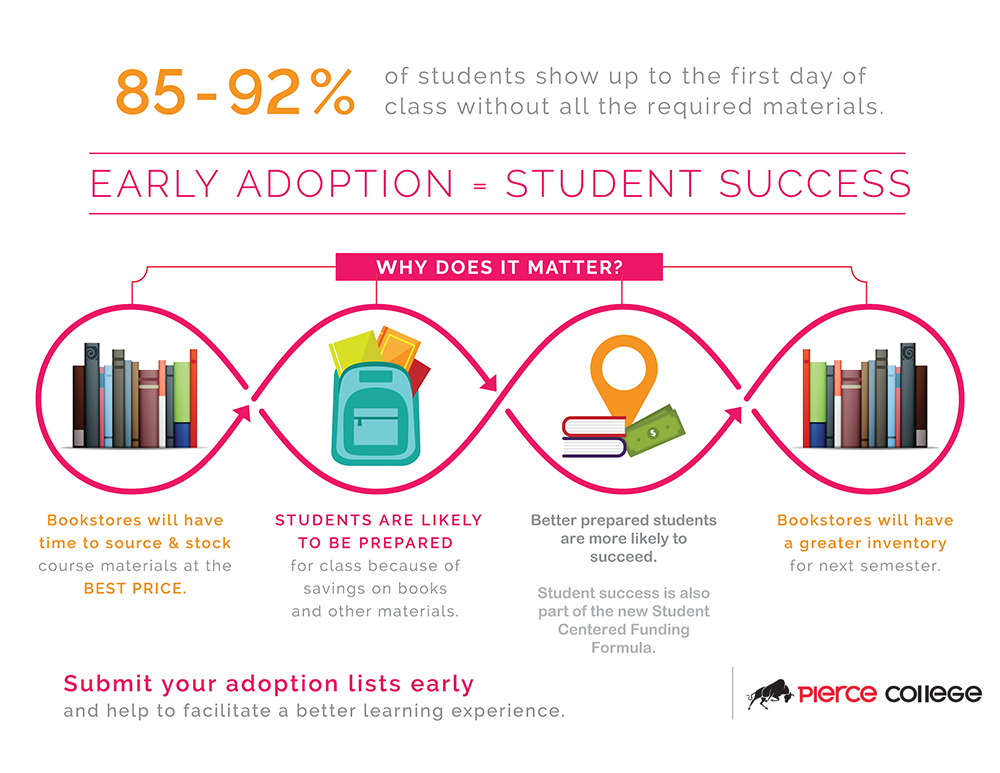Faculty
Instructions:
Faculty Graduation Regalia
Textbook Adoption PolicyForms & Return Information:
Textbook Adoption Due Dates:
Summer and Fall - April 15th
Winter and Spring - October 15th
Please Send Textbook Adoption Forms to:
textbookorder@piercecollege.edu
Textbook Adoption Form (PDF)
Requisition Instructional Materials Form - Send to textbookorder@piercecollege.edu
Instructional Fee Notification Form - Send to textbookorder@piercecollege.edu

FAQs For Faculty Textbook Requisitions
Q: Why Are Textbook Requisitions Due So Early?
A: Textbook requisitions are due early to comply with the 2008 Higher Education Opportunity Act (HEOA, 2008) law and the Pierce College Academic Senate Policy on November 21, 2011, which are both essential to keeping costs down and making sure course materials are accessible. Also, it takes time to research all title information submitted to us (new editions, stock availability, rental eligibility, lower cost formats, used books for end-of-term buyback, etc.) and get books on the shelves on time.
Q: Can I Still Turn In My Textbook Adoption After The Deadline? What If I Want To Make Changes?
A: Yes, of course you can! We understand that there may be schedule changes or even curriculum changes. Please know that the earlier you let us know, the better for everyone. Changing a book could result in more costs, books not arriving on time, and/or students having to go through refunds and exchanges.
Q: What If I’m Not Using A Textbook? What If The Textbook I’m Using Is The Same As Last Semester?
A: If you are not using a textbook, you still need to submit a textbook requisition with “No Text Requiredâ€. If you are using the same textbook as last semester, you still need to let us know by submitting a textbook requisition every semester.
Q: Why Doesn’t The Bookstore Order 100% Of Enrollment?
A: Our order decisions are based on sales history and stock availability. Even though a class may have 50 students, we know that not all 50 students will purchase from the bookstore. Last semester, we may have sold only 15 books, which is why we decided to bring in 20 books this semester.
In addition, students are savvy shoppers. We know they’ll shop the online marketplace first (Amazon, other sources, etc.). We also know that some students share books, while others wait to see if they can pass the class without ever buying the book.
Every semester, we return tens of thousands of unsold books back to publishers. If ever we do run out of books, students always have the option of placing an online order, which gets placed on backorder. Once the book arrives from the publisher and the online order is processed, an email notification will be sent to the student.
FAQs For Faculty OER
Q: What is OER?
A: OER stands for Open Educational Resources. "Open Educational Resources are teaching and learning materials that you may freely use and reuse, without charge. OER often have a Creative Commons or GNU license that state specifically how the material may be used, reused, adapted, and shared" (OER Commons1). OER materials can include textbooks, test materials, instructional videos, and other learning materials and tools.
OER might be similar to what you are currently doing. If you have ever used a worksheet that another instructor created, that's the basic concept of OER. Fundamentally, the only difference between OER and the worksheet you got from a colleague (or vice versa) is that the open license gives you and others formal permission to use, adapt and share it.
Q: Why Might OER be Important to Students and Faculty?
A: OER materials are available to students on day 1 of class, avoiding delays due to financial difficulties, and enhancing student equity. Instructors determine their own revision schedule, thereby avoiding publisher pressure to change editions. Students benefit from reduced textbook costs.
Q: How Does the Quality of OER Compare to Commercially Published Material?
A: Textbook quality varies for both open and commercially published materials. Just as with selecting a commercially produced textbook, faculty must evaluate the quality of a particular OER text.
Q: Do We Have to Use OER?
A: No. Using OER is not a requirement for faculty, but you are certainly encouraged to explore possibilities for open content that provide a more cost-effective alternative to your students.
Q: Can I list an OER Textbook on My Course Outline?
A: Yes, it should be listed on the course outline in a way that a reviewer could access the content (e.g., ISBN or URL).
Q: How Do I Find OER for My Course?
A: Several online sites and repositories exist that contain OER supporting a variety of disciplines and subject areas.
Q: How Long Does it Take to Adopt an OER Textbook?
A: Adopting an existing OER textbook without modification takes the same amount of time as adopting a traditional text.
Q: Will Courses Using OER in the CA Community Colleges Transfer to the CSU?
A: The articulation statement from the CSU and UC (2017) is as follows:
It is fine to use assembled materials or Open Educational Resources, so long as they're stable and publicly available as published textbooks (and not a list of links).
All CSU and UC campus departments consider the content of textbooks when reviewing articulation proposals from the CCCs. The use of online texts is reviewed by campuses on a case-by-case basis for articulation with CCCs. There are multiple CCC courses that use online texts that are approved for CSU- and UC-transferability, and for articulation with CSU and UC campuses.
Some CSU and UC campus departments use online texts themselves.
- Nancy Purcille, Transfer Articulation Coordinator, University of California, Office of the President
- Alison M. Wrynn, Ph.D., State University Associate Dean, Academic Programs, California State University, Office of the Chancellor
